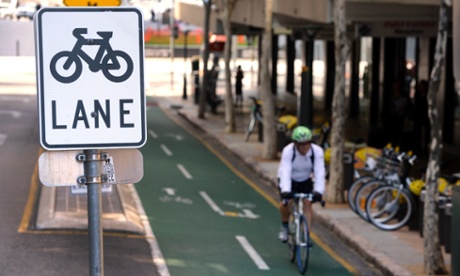Heart Foundation says a European-style ride-to-work cycle scheme would boost bicycle use and reduce healthcare costs

Half of all workers would ride a bicycle to work if they were paid to do so, research suggests.
The Heart Foundation and Cycling Promotion Fund says its survey shows a national ride-to-work scheme would be positive.
They’re calling on the federal government to set up an incentive scheme, similar to ones that already exist in Europe.
Boosting bicycle use would improve people’s health and reduce Australia’s healthcare cost, the foundation says.
“Currently inactivity is responsible for 16,000 premature deaths and costs the Australian economy $14bn every year,” says the Heart Foundation’s director of cardiovascular health, associate professor Trevor Shilton.
Of the 2,000 Australian workers surveyed, all of whom currently don’t ride to work, 50% said they would cycle to the office if they were offered some kind of financial benefit.
Up to 80% of respondents supported the implementation of a cycle-to-work plan, regardless of whether they would ride to work themselves.
Several countries including the UK, France, the Netherlands, Denmark, Germany and Belgium have bicycle schemes for workers, with different kinds of incentives, such as payments per kilometre, tax breaks and financial support for buying bikes.
If implemented in Australia, a mature scheme of subsidies and tax breaks was estimated to cost the government about $15m over five years in forgone revenue.
Only 1% of Australian workers cycle to work, compared to 66% who drive, says Shilton.
“There are no easy answers to reversing the lack of physical activity in all our lives, but with lack of time cited as the biggest barrier, supporting people to get their daily dose of exercise on the way to work would be a big step in the right direction.”
Three ride-to-work scheme ideas
- Direct subsidy: employee paid set amount per kilometre to ride to work, based on French model.
- Indirect subsidy: employers receive tax refund for employees who cycle to work, which is then paid to the employee. Several European examples.
- Tax deduction for purchase: tax concession for purchase of a bike (value normally capped at $1,500) for riding to work. Possible savings of 30-40%. Based on UK model.
